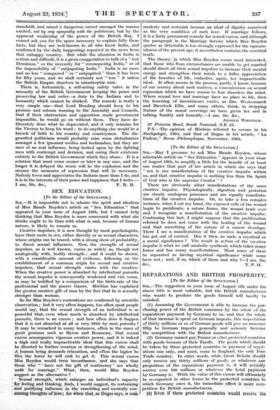SEX EDUCATION.
[To the Editor of the SPECTATOR.] is impossible not to admire the spirit and idealism of Miss Maude Royden's article on " Sex Education " that appeared in your issue of August 16th, but I cannot help thinking that Miss Royden is more concerned with what she thinks ought to be than with what is and, because of human nature, is likely to remain so.
Creative impulses, it is now thought by most psychologists, have their roots in sex, either directly or as sexual characters; whose origins can be traced, with a strong show of probability, to direct sexual influences. Now, the strength of sexual impulses, as is well known, varies as widely as, though" not analogically with, bodily strength ; and it could be shown, with a considerable amount of evidence, following on the establishment of a common origin for sexual and creative impulses, that sexual strength varies with the creative. When the creative power is absorbed by intellectual pursuits the sexual impulse is consequently weakened and vice versa, as may be testified by a comparison of the birth-rate of the professional and the poorer classes. Moebius has explained the greater creative gift of man by the fact that he is sexually stronger than woman.
So far Miss Royden's contentions are confirmed by scientific observation ; but it very often happens, too often most people would say, that the sexual strength of an individual is so powerful that, even when much "is absorbed by intellectual pursuits, there is an excess ; and how often does it happen that it is not absorbed at all Or very little by such pursuits ? It may be remarked in many instances, often in the cases of great geniuses such as Byron and Rousseau, that sexual excess accompanies vigorous creative power, and it is indeed a high and really impracticable ideal that this excess shall be directed to further creation or strengthening of the mind. A human being demands relaxation, and often the higher he flies the lower he will sink to get it. This sexual excess Miss Royden would term incontinence, and she says that those viho " have not the gift of continency ' are wholly unfit for marriage." What, then, would Miss Royden suggest as the alternative ?
Sexual 'strength, which enlarges an individual's capacity ' for feeling and thinking, finds, I 'would suggest, its restraining and purifying influence in the ennobling and mentally. can- - swning thoughts of love; for when that, as Dugas says, is real,
modesty and restraint become an ideal of dignity conceived as the very conditio'n of such love. If marriage follows, it is a fairly permanent remedy for sexual excess, and although the paragraph in the Marriage Service which Miss Royden quotes as detestable is too strongly expressed for the squeam- ishness of the present age, it nevertheless contains the essential truth.
The theory, in which Miss Royden seems most interested, that those who from circumstances are unable to get married should direct all their sexual impulses to increase their mental energy and strengthen their minds to a fuller appreciation of the beauties of life, embodies, again, her impracticable ideal. It often means in the process, partly, I know, because of our secrecy about such matters, a concentration on sexual repression which we have reason to fear disorders the mind. Where sexual love and marriage have no place in life, then the lessening of incontinence exists, as Drs. Westermarek and Havelock Ellis, and many others, think, in stripping Nature of the moral coverings we have given her and in talking frankly and honestly.—I am, Sir, &c.,
ARNOLD WHITTICK. 27 Princess Road, South Norwood, S.E. 25.
P.S.L-The opinion of Miiebius referred to occurs in his Stachyologie, 1904, and that of Dugas in his article, " La Pudeur," Revue Philosophique, November, 1003.


































 Previous page
Previous page